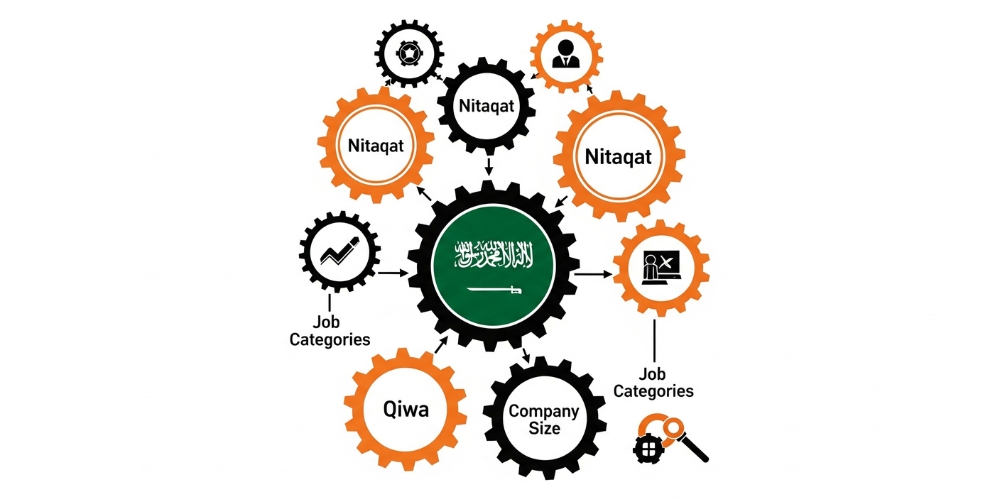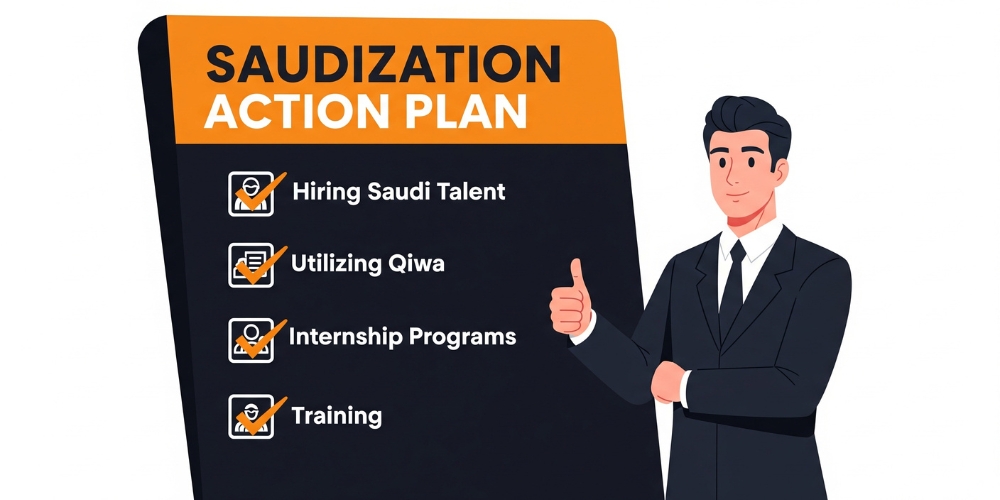
TL;DR
- Saudization requires private companies to hire Saudi nationals in specific roles.
- Employers are ranked by compliance using categories like Platinum, Green, etc.
- Non-compliance can lead to blocked visas, fines, and more.
- Each industry has specific Saudization percentage targets and job role requirements.
- Use tools like Qiwa, Tamheer, and Hadaf to stay compliant.
Hiring in Saudi Arabia isn’t just about finding qualified talent anymore. Employers now have a bigger responsibility, making sure their teams reflect the country’s national workforce goals. That brings the question, “What is Saudization?”. For businesses across the Kingdom, especially those in the private sector, knowing the rules around Saudization isn’t optional. It’s essential for staying compliant, growing sustainably, and planning for the future.
Saudization doesn’t have to be a roadblock. When companies have a clear plan and invest in the right people, it becomes a growth strategy. This blog will look at what Saudization really involves and how you can make it work without slowing your team down.
What is Saudization?

Saudization, officially known as the Nitaqat Program, is a national initiative by Saudi Arabia’s Ministry of Human Resources and Social Development (MHRSD). The goal? Replace a portion of the foreign workforce with qualified Saudi nationals across different industries. So when we ask what is Saudization, we’re essentially talking about one of the Kingdom’s core economic reforms aligned with Vision 2030.
This initiative doesn’t apply equally across all roles. The government has defined over 269 professions in the private sector that are either fully or partially reserved for Saudis. Roles like customer service, IT, engineering, and HR are part of what the government classifies as Saudization professions.
What is Saudization? – Your Guided Journey
How Does Saudization Work?

The Saudization policy assigns companies into different categories (Platinum, Green, Yellow, and Red) based on their performance in hiring Saudis compared to other firms of similar size and industry. Each sector has a minimum Saudization percentage that must be met to stay compliant.
For instance, technical engineering Saudization policies are pushing firms to prioritize hiring local talent for civil, electrical, and mechanical roles.
Employers that meet or exceed these targets are rewarded with easier access to government services, fast-track visa processing, and enhanced credibility through a Saudization certificate, which may also require accurate GOSI registration for compliance. Those who fall short? They face penalties, limited services, and difficulty renewing work permits for expat staff.
Why is Saudization Important for Employers?

Ignoring Saudization is a legal risk. It’s a business risk. Failing to meet your quota could restrict access to government platforms like Qiwa, delay service approvals, and even block new work visas. But beyond compliance, investing in Saudized talent creates long-term benefits. Hiring Saudis can improve cultural alignment, reduce onboarding times, and show your brand is aligned with national values.
Why is Saudization Important for Employers? Myth or Fact
Saudization Targets by Industry

The Saudi government takes a tailored approach when it comes to workforce policies. Instead of a blanket rule, Saudization percentage requirements differ based on the industry, the size of the business, and the type of job. In some cases, the required percentage can go all the way up to 100% for certain positions. Here’s a quick look at how it plays out across major sectors.
- Retail: Up to 70% Saudization in some sub-sectors, especially in sales and customer-facing roles.
- Construction & Engineering: The focus is growing on technical engineering Saudization, targeting civil engineers, surveyors, and site inspectors.
- Healthcare: There’s aggressive Saudization in health sector, pharmacy, radiology, lab technicians, and health informatics now fall under mandatory localization.
- Hospitality: Hotels and tourism establishments are expected to reach 40% Saudization in reception and administrative roles.
- IT & Communications: The 2024 directive pushed for 100% Saudization of roles like software developers and cybersecurity specialists.
Additionally, as part of the broader Saudization plans 269 professions private sector, the Ministry regularly releases updated lists of job titles reserved for Saudi nationals, impacting sectors such as education, insurance, and energy.
Why is Saudization Important for Employers?
What Happens If You Don’t Meet Saudization Targets?

Falling short of your Saudization obligations isn’t just a missed opportunity. It can halt your operations.
If your business is categorized in the Yellow or Red zones under the Nitaqat program, you may face:
- Suspension from accessing services on Qiwa, Mudad, and other HRSD platforms
- Inability to renew or issue work permits for foreign staff
- Delays in government contract approvals
- Fines and possible closure for repeated non-compliance
Not having a valid Saudization certificate can also affect your credibility with local clients and partners, especially when HR automation in KSA is rapidly changing how compliance is monitored.
What Happens If You Don’t Meet Saudization Targets?
How Employers Can Comply with Saudization

Getting compliant with Saudization doesn’t have to be complicated. Here’s how to get on track:
- Understand Your Sector’s Requirements
Log into the Qiwa portal to check the required Saudization percentage for your industry and company size. - Audit Your Workforce
Identify current gaps in your staffing structure. Focus on roles that fall under Saudization professions. - Hire Strategically
Prioritize hiring Saudi nationals for new roles and when replacing outgoing staff, especially in functions listed under the Saudization plans 269 professions private sector. - Train and Upskill Local Talent
Invest in onboarding and development programs that enable Saudis to grow into mid- and senior-level positions. - Maintain a Valid Saudization Certificate
This certificate reflects your compliance and helps unlock additional government services. - Monitor Progress
Use tools like Qiwa and Mudad to track hiring ratios and forecast how changes will impact your score.
Government Support for Saudization

The Saudi government has put systems in place to support businesses with Saudization. Instead of leaving companies to manage it alone, several programs have been introduced to simplify the process and encourage local hiring.
- TAQAT: A national platform that connects employers with qualified Saudi job seekers
- Hadaf (Human Resources Development Fund): Offers salary subsidies, on-the-job training support, and incentives for companies hiring Saudi nationals
- Tamheer Program: Provides financial support for fresh graduates undergoing internships in private-sector companies
- Qiwa Platform: Central hub for calculating your company’s Saudization percentage, viewing classification, and issuing the Saudization certificate
In 2023 alone, more than 400,000 Saudis were employed under localization programs supported by Hadaf. With increased adoption of tools like Qiwa and initiatives similar to the Nafis program supporting the Emirati workforce, this number is expected to grow.
How Employers Can Comply with Saudization
Conclusion
Saudization is about shaping a workforce built on local talent and aligned with the Kingdom’s long-term goals. As more roles are added to the list of Saudization professions, businesses across sectors, from healthcare to tech, need to take an active role in hiring Saudi nationals. Understanding what is Saudization, adjusting your strategy, and tapping into available support programs can help you meet requirements, earn your Saudization certificate, and build a team that supports both business growth and national progress.




